
Arquivo para a ‘Information ethics’ Categoria
God the image of man
It was Feuerbach who was the first to make an anthropological reduction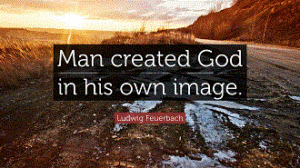 of theology, his god is made to establish man, there is no liberation of man without the negation of god. He started from the assumption that religion is the expression and cause of human alienation, he saw it like this: “man’s knowledge of God is only man’s self-knowledge and his own essence”, in a clear allusion to Hegel’s Absolute.
of theology, his god is made to establish man, there is no liberation of man without the negation of god. He started from the assumption that religion is the expression and cause of human alienation, he saw it like this: “man’s knowledge of God is only man’s self-knowledge and his own essence”, in a clear allusion to Hegel’s Absolute.
His analysis of the religious attitude and the concept of alienation, Feuerbach influenced the socialist thinkers of the 19th century, especially Karl Marx, is among others (called Old Hegelians) a transition between Hegelian idealism and historical materialism.
Its analysis is important because many today reaffirm this idea that it is the material basis that constitutes man’s consciousness, the consciousness of God is the consciousness that man has of himself, the knowledge of God is the knowledge that man has of himself even so god of prosperity and who gives human material goods is Feuerbach’s god.
This is also present in contemporary religions, a god of power and wealth.
We have already elaborated that Hegel’s god of the Absolute is not relation and therefore not Trinitarian.
His reading is: ““the hermeneutic key that the author uses to understand religion is the following: religion is anthropology, ‘theology is anthropology’, so what man says about God, through religious language, is nothing else. than a confession of his aspirations and projects”, however it is God who creates to satisfy only immediate human needs.
This does not mean a God in nature who does not know man, otherwise the figure of Jesus would just be a superior being with no relation to man, including his human needs.
The Hegelian world created this selfish and merely human face, where gifts and divine asceticism do not exist.
Feuerbach, Ludwig (1988) A essência do cristianismo. Brazil, Campinas: Papirus, 1988.
The Russian counter-offensive and threat
The week promises to be tense in the war in Eastern Europe, Ukraine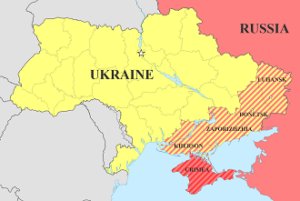 has announced the start of its counter-offensive and Russia is threatening retaliation for Western aid in armament for this new phase of the war.
has announced the start of its counter-offensive and Russia is threatening retaliation for Western aid in armament for this new phase of the war.
Peace is a long way off, now it’s really about the occupied territories the point of contention, and the whole question of the threat of borders and NATO advance is no longer the point, even if it is touched, the four partially occupied territories: Lugansk, Donesk, Zaporizhzhia and Kherson are claimed by both warring countries, as well as Crimea.
After several countries announced arms and financial support for Ukraine, Russian threats escalated and threatened with “strategic” nuclear weapons, but any war on one of the NATO countries is immediately declared war on all and the conflict could escalate.
In the province (oblats) Belgorod in Russian territory was the first conflict inside the country in this war, right-wing and anarchist anti-Putin groups appeared on the scene, indicating that something is already happening inside Russia, the Russian government says it is under control, however evacuated the region.
The scenario is quite worrying, because the scale of the war and a possible conflict on the soil of NATO countries could mean an open start of a third world war, the Russian threats do not seem like a bluff, but a response to Western aid that prolongs the war and gives survival to the conflicting Ukrainian forces.
The displacement of nuclear weapons from Russia to Belarus and warships in the oceans indicate that the danger of responding to the West is real and could happen.
Although in the war in Ukraine it was demonstrated that there is a war capacity to intercept Russian hypersonic missiles, with nuclear charges no matter where they are detonated they will have a devastating effect on the environment and human life.
It remains for those who desire peace to ask that conflicts cease and that men return to serenity and respect for human life and nature.
Controversies of spiritual and philosophical asceticism
To deny asceticism, one resorts to the idea that it would be impregnated with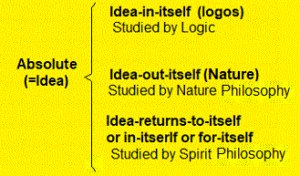 “Christian exegesis”, however, the literature itself shows that this is a contradiction, since both idealist philosophy tries to remake a vision of what is spiritual in the “Phenomenology of the Spirit” and also more modernly Foucault ( ) will say that the Greeks in the Hellenistic and Roman times would be far from understanding the term we call ascesis. “Our notion of asceticism is, in fact, more or less modeled and impregnated by the Christian conception”. (FOUCAULT, 2004, p.399).
“Christian exegesis”, however, the literature itself shows that this is a contradiction, since both idealist philosophy tries to remake a vision of what is spiritual in the “Phenomenology of the Spirit” and also more modernly Foucault ( ) will say that the Greeks in the Hellenistic and Roman times would be far from understanding the term we call ascesis. “Our notion of asceticism is, in fact, more or less modeled and impregnated by the Christian conception”. (FOUCAULT, 2004, p.399).
In Michel Inwood’s Hegelian dictionary, we find the concept of Spirit (geist): “Geist includes the most intellectual aspects of the psyche, from intuition to thought and will, but excluding and contrasting with the soul, feeling, etc.”, however Spirit in Hegelian usage has a meaning that is both similar and different from that used in everyday life (in the sense of the soul) and in philosophy, since there is also a “Trinitarian” meaning there.
As in all idealist philosophy, Hegel is a post-Kantian it is good to say, there is a search for overcoming the subject and object duality, for Hegel it is found in the Absolute Spirit, said in such a way as to propitiate an encounter between the subject and the object, forming an identity that takes place within the mutual relationship between subjectivity and objectivity.
While in Kant transcendence is what makes the Subject go to the object, in Hegel it is the Absolute that marks a meeting between the subject and the object, forming an identity that takes place within the mutual relationship between subjectivity and objectivity, but in both there is no Being in transcendence.
It is important to understand this relationship because in it what Hegel treats as an essential intellectual activity takes place, for the intellective apprehension both about the object (which is precisely the moment of alienation as a “going out of the Self”) and about the subject itself (the return to subjectivity after the experience with the object, that is, the Other as he sees it), thus different from the ontology of Husserl, Heidegger and others, who see in this an ontological relationship with Being.
For this, one must penetrate the Hegelian categories: in-itself, of-itself and for-itself, said in the Philosophy of Right as: “In effect, the in-itself is consciousness, but it is also that for which it is a Other (the in-itself): it is for consciousness that the object’s in-itself and its being-for-an-other are the same. The I is the content of the relationship and the relationship itself; it confronts an Other and at the same time surpasses it; and this Other, for him, is only himself” (HEGEL, 2003);
Many contemporary philosophers will see the Other, as something beyond the Self, and a for-itself something beyond the Self and the Other, a “for” beyond.
Although there are controversies both in Hegelian idealism and in his “Trinitarian” dialectical conception, it is important to note that for him the members of a community should always have among the principles the one that “has objectivity, truth and morality” (HEGEL, 2003, §258).
Foucault, Michel. (2004) A hermenêutica do sujeito. Transl. Márcio Alves da Fonseca; Salma Tannus Muchail. Brazil, São Paulo: Martins Fontes.
Hegel, G.W.F. (2003) Princípios da Filosofia do Direito. Transl. Orlando Vitorino. Brazil, São Paulo: Martins Fontes.
Inwood, M. J. (1997) Hegel. Dicionário Hegel. Transl. Álvaro Cabral. Brazil, Rio de Janeiro: Jorge Zahar Editor.
Visit to Rome, Counteroffensive and Pulitzer Prize
The week was all about Ukraine: a visit to Rome and the pope, advances in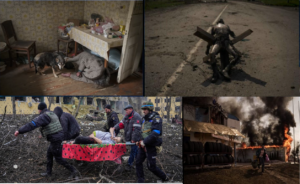 Backhmut and photos from the war that drew attention when they won the Pulitzer Prize, the photos are shocking and perhaps say more than words, since today there is even incomprehensible rhetoric favor of war.
Backhmut and photos from the war that drew attention when they won the Pulitzer Prize, the photos are shocking and perhaps say more than words, since today there is even incomprehensible rhetoric favor of war.
In the strategic plan, there is no Portuguese analyst Germano Almeida pointed out: “here in the West we are not yet aware of the plans, so there is a Ukrainian idea that this is just the beginning and nobody knows where in fact this counter-offensive can be launched because the Bakhmut’s question could be a first diversion maneuver [discussion] and the essential thing and the mass offensive could be elsewhere”, says Almeida.
The visit to Italy, in addition to the country’s already declared support, the visits to Italian President Sérgio Mattarela and with Prime Minister Giorgia Meloni, he also participated in a talk show on Italian TV, about the pope, all that is known is an agreement humanitarian assistance to refugees.
The images that won the prize also have a Brazilian on the list: Felipe Dana, from Rio de Janeiro, who filmed and photographed scenes from Bucha, the most cruel and violent massacre carried out by Russia in Ukraine (first photo below), it is worth remembering that the war was also from Vietnam had awards on the horrors there.
Some images from the 2023 Pulitzer Prize given to several Associated Press photographers, including the Brazilian, if words don´t move, maybe the images will.
The Other, the Infinite and the Truth
The development of the question of Being in modern philosophy is not separated from the religious question, Gadamer recalls the example of the gods in works of art from the Greek world (Gadamer, 1997, p. 18),
from the religious question, Gadamer recalls the example of the gods in works of art from the Greek world (Gadamer, 1997, p. 18),
The other is treated in different areas of ontology, becoming almost an essential category.
Another important point on the path to Truth, states that it is necessary to recognize: “The finitude of understanding itself is the way in which and where reality, resistance, the absurd, and incomprehensible reaches validity.” (Gadamer, 1997, p.24), and expands this history to the historical one, where he criticizes Dilthey’s romantic historicism and emphasizes that it is not ahistorical.
Thus, the path (or the method) to the Truth is traced the development of the hermeneutic circle as a new and revolutionary method for the Truth, listening to the text (or the Other) and performing a fusion of horizons, where it is possible to see and rethink more clearly the Truth.
The simple elaboration of narratives that justify the power of certain truths is nothing more than a return to the obscurity and opportunism of the modern sophist discourse, now using as a resource the limits and specialties of certain sciences, for example, law and economics that seen in their restricted fields are nothing but sophisms that justify each other.
When analyzing the possibility of the end of metaphysics, Gadamer points out: “If science rises to total technocracy, and thereby covers the sky with the “night of the world” of “forgetfulness of being”, the nihilism predicted by Nietzsche, may if then you keep looking behind the last glint of the sun that went down […]” (GADAMER, 1997, p.27), that is, science is not part of this question.
A true humanism must look to the infinite, not just the one that is now visible through the James Webb megatelescope (which raises many questions as well), it cannot fail to ignore the infinite, the mystery and the religious phenomenon.
For Christians, this truth was revealed humanly and visibly in Jesus, last week we remember the disciples saying “Show us the Father” (Jn 14:8), now on another front Jesus reveals himself more fully to those who follow him (Jn 14:8). 14, 16-17): “And I will pray the Father, and he will give you another Advocate, that he may abide with you always: the Spirit of Truth, which the world is not able to receive, because it neither sees him nor knows him” .
This is not an arrogant Truth, it can and must dialogue with the cultures of our time.
Gadamer, H.G. (1997) Verdade e método. Transl. Flávio Paulo Meurer. Brazil: Petrópolis, RJ: ed. Vozes.
The fundamental question of the method
The historical question could not be missing, in fact before the book “The truth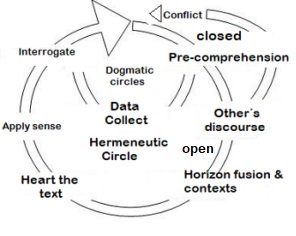 and method”, it was a lecture by Gadamer that started this work, called “The question of historical conscience”, the book was corrected and translated into English after publication of the masterpiece, and from this version came the Portuguese version.
and method”, it was a lecture by Gadamer that started this work, called “The question of historical conscience”, the book was corrected and translated into English after publication of the masterpiece, and from this version came the Portuguese version.
Thus the author states: “Because, only with the failure of the naive historicism of the historical century, it becomes evident that the opposition that exists between a-historical-dogmatic and historical, between tradition and historical science, between ancient and modern, is not absolute.” (GADAMER, 1997, p.22).
So it is in the face of this finitude of knowledge that one must depart: “The finitude of understanding itself is the way in which and where reality, resistance, the absurd, and the incomprehensible reaches validity. Anyone who takes this finitude seriously must also take the reality of history seriously” (Gadamer, 1997, p.24), and from there he resumes and reorganizes the hermeneutic circle.
Thus, what he calls effectual history starts from the understanding of “what makes the experience of you so decisive for all self-understanding” (idem), it will be from there that he will elaborate his philosophical hermeneutics, which seems paradoxical, he states: “precisely Heidegger’s critique to transcendental questioning and his thought of the “turn” (Kehre) serves as a basis for the development of the universal hermeneutic problem, which I undertake” (Gadamer, 1997, p.25), and thus for him “language does not arise in the consciousness of those who speaks” and has nothing to do with subjectivity, since the subject’s experience has nothing “mystical” or “mystifying”.
He clarifies that his methodology goes beyond a purely metaphysical view, and says about the method of idealism: “I think that Kant’s Critique of Pure Reason is binding, and that propositions that do nothing more than add, by thought, and dialectically, the infinite to the finite, the being in itself to what is humanly experienced, the eternal to the temporal, I consider them as mere extreme determinations, from which, by the strength of philosophy, no knowledge of our own will be able to develop. (GADAMER, 1997, p.26).
With regard to metaphysics, he clarifies that even the Hegelian tradition, which does not abandon the idea of infinity, has: “the tradition of metaphysics and especially its last great formulation, Hegel’s speculative dialectic, contains a constant proximity.” (idem).
And he resumes Heidegger’s question of the oblivion of being: “What does the end of metaphysics mean, as a science? What does it mean to finish in science? If science rises to total technocracy, and thereby covers the sky with the “night of the world” of the “oblivion of being”, the nihilism predicted by Nietzsche, then one can look behind the last glint of the sun that has set […]” (GADAMER, 1997, p.27).
The opening to the Other opens up a perspective of merging the horizons of the Being, which applies a new meaning to the text (or discourse) and allows one to question oneself about the truth and reach it, this is the hermeneutic circle.
Gadamer, H.G. (1997) Verdade e método. Transl. Flávio Paulo Meurer. Brazil: Petrópolis, RJ: ed. Vozes.
Arete’s Absence
The Greek virtues and educational formation, through paideia referred to the total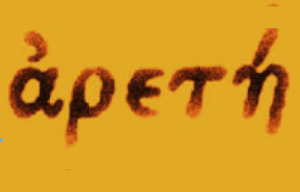 formation of the Greek man, so Areté was this peak (translated as ideal, however the modern ideal refers more to the subjective x objective dualism than to the Greek Eidos, which is more linked to having a vision, showing reality).
formation of the Greek man, so Areté was this peak (translated as ideal, however the modern ideal refers more to the subjective x objective dualism than to the Greek Eidos, which is more linked to having a vision, showing reality).
Thus, the total vision (for the time, but less segmented than today), indicated a man who was a citizen of the polis with virtual attributes (this is the true meaning, coming from virtus), which placed him in harmonious conjunction with the city-states and their statutes.
Both in culture, and mainly in politics today, these attributes are little lacking, it is more about building a narrative that justifies all brutal power over the citizen, so the laws are made in order to protect the oligarchy in power, it is It is also true that in Greek times those who were citizens were limited to free men (there were slaves) only.
The worsening of bipolarization, where coexistence is not possible, has a dangerous aspect for exclusivist authoritarianisms where a part of society must be segregated.
The areté is missing, so it is impossible to think of statesmen, leaders who think of society as a whole, because their culture and concepts are based on that part they belong to and claim that their model is universal, thus justifying their barbarism.
Already in the reading of the historical books “Ilíada” and “Odisséia” we register this ideal of areté as strength, dexterity and heroism of the warriors, qualities that were uncommon to the men of that time, so it is a fact that in the origin they also served the purpose of the war.
However, a modern areté that would lead us to honesty, to the spirit of dialogue, not the hypocrisy of talking only with those who suit us, could lead us to a new civilizing eidos.
A culture that does not ignore history and what is good and lessons learned through it, a vision of the polis that goes beyond partisan selfishness and the game of interests, a policy that could “see”.
Worldly blindness leads the civilizing process more and more to collapse, barbarism and hatred.
Only a modern areté that leads men to a culture of peace will revert the civilizing process to the common good.
War and our dayli bread
As one of the largest grain producers, Ukraine at war would certainly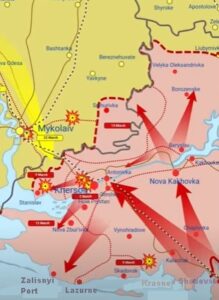 affect the market, and it took a while but it happened, the Chicago Stock Exchange recorded an advance in the price of wheat last week, and soon it will reach the market and our daily bread.
affect the market, and it took a while but it happened, the Chicago Stock Exchange recorded an advance in the price of wheat last week, and soon it will reach the market and our daily bread.
A product on the rise can drag down other products (such as corn, for example), the more advanced countries seemed to already know this and took preventive measures: China, Russia and the USA have already been reinforcing stocks and taking protective measures, in our if we trust agribusiness, but we cannot forget that we are part of a global trade.
And if the war were to end, we drew a picture last week of the Ukrainian counter-offensive and the Russian expectation, which expects a new offensive in the North, as it was in the resumption of Kharkiv last year, but now it seems that the scenario will be different.
The war has grown into technology, Russia has frequently blocked US-made mobile rockets in Ukraine (according to CNN), while Ukraine has intercepted Russia’s sophisticated hypersonic missile (according to Brazilian site G1).
In the North, where the new republics of Donesk are located, according to analyst Niklas Masuhr of the Center for Security Studies at the Federal Polytechnic School of Zurich, Russia has erected trenches in the region, to avoid Ukrainian actions that are always unlikely and change places easily for they know the land (on uol site).
But attacks can happen to the south, despite being small villages around Odessa, such as Lazurne (3,800 inhabitants), Zalizniy Port (1,500 inhabitants) and Krasne (1,300) beach towns and strategic city Zapozhshya.
The Ukrainian tactic has always been to surprise the Russian army and change strategy where it finds less resistance, a good part of the Russian army was withdrawn from the Crimea which is close to this region via the Black Sea, the grain trade is already looking at this scenario.
The week that begins will determine the strategy and tactics of each side, unfortunately the war continues and the damage to all humanity will begin to reach everyone’s table, and the poorest in particular.
The question of the consciousness of Being
Thanks to the new and surprising advancement of deep intelligence machines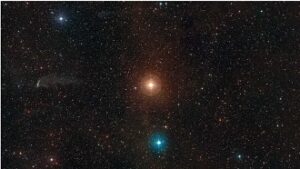 (deep learning), the issue of consciousness, which was already thought of in philosophy, now spreads across all areas of thought, and what we dealt with in previous posts also dealt with this.
(deep learning), the issue of consciousness, which was already thought of in philosophy, now spreads across all areas of thought, and what we dealt with in previous posts also dealt with this.
Now it is a matter of deciding whether it is possible to think of consciousness only as something logical and instrumental, so the machine, through deep and elaborate algorithms in dialogue with humans, could reach this level, if something beyond, which we reformulate in the category for-itself, then we have to think of a consciousness of the universe and it cannot be a thing, but a Being.
Why is there something and not nothing is a question raised since Leibniz, who solves it through the monad, and God is (would be) the “Monad of monads” (the phrase is from Hegel, sic!), then the universe was putting into movement, then in a quantum space-time, the Big Bang, and now the James Webb telescope captures an image that would be of a possible origin of the universe, with many galaxies, something is wrong.
In an article published in the journal Nature on February 22, “A population of red candidate massive galaxies 600 Myr after the Big Bang” (Labbé et al.) (Myr, millions of light years) indicates that close to the big bang there would already be massive galaxies and not the first formations of nebulae, for example (see our post), so could it be that there was already a universe in formation from the beginning?
Regardless of this, the question remains: who what or what mystery sent the beginning of everything.
Just as one cannot speak of ethics without metaphysics, it is not something substantial but spiritual, one cannot speak of consciousness only as something natural, based on experience.
Starting from Husserlian phenomenology, his disciple Heidegger elaborated consciousness as follows: the phenomenology (experience) of consciousness is not a path that lies before natural consciousness and leads it towards the absolute, like an itinerarium mentis in deum (Heidegger, 2007 , p. 169), rather it is the course that the absolute itself follows on the way to the truth of its complete appearing. (Heidegger, 2007, p. 169)
But Heidegger continues as in any modern building, he has the question of knowledge as a pillar of natural consciousness, he does not admit a transcendent revealed consciousness (for-itself), thus being a knowledge that has not yet realized in itself the whole truth (Heidegger 2007 , p. 169).
So it is about denying the truth revealed as truth, although your consciousness remains linked to the Being (it is ontological as your thought), there is no possibility of a pure primordial Being, a Being-for-itself, omniscient and omnipotent, so we are left looking at the telescope image.
There is a transcendent for-itself that surrounds this question, and thus a consciousness that projects beyond even the beginning of the universe, and that at the same time is present in every being-in-itself.
Heidegger, Martin (2007). Hegel. Translation by Dina V. Picotti C. Buenos Aires: Prometeo Libros, 2007.
.
Ukraine’s counter-offensive and peace
On Wednesday Roast Ukraine’s Volodymir Zelenksy spoke with China’s President Xi Jinping and some peace talks appear to have moved forward.
Xi Jinping and some peace talks appear to have moved forward.
On his twitter Zelensky said: “I believe that this phone call, as well as the appointment of Ukraine’s ambassador to China, will give a powerful impetus to the development of our bilateral relations.”
The narrative of a peaceful country contradicts the controversial statements of its ambassador to France, Lu Shaye, also the left-wing forces abroad are beginning to show a pro-Putin position, like a motorcycle made in Germany in this sense.
On the other hand, on the battlefield, the counteroffensive promised by Ukraine began, several Russian positions were hit, in conquered territories, in Crimea and even some Russian villages, Russia expected an offensive in Crimea or in Donbass where its troops faced bloody battles in recent weeks, such as that of Soledar and Bakhmut . (see on the map in blue the reconquer Ukrainians in red the Russian invasion).
In September of last year, while Ukraine was threatening attacks to the south, making Russia move forces there, it ended up attacking to the north, where the Russian army had huge losses.
Russia withdrew most of its military arsenal from the Crimea, yet a fuel supply base was hit in this new Ukrainian counter-offensive.
The stalemate of forces in the Donbass region may indicate the real source of conflict at this moment, and the place where Ukraine intends to concentrate its counter-offensive, this time Russia seems to be waiting because it has already moved troops from Crimea, even with the explosion of the depot of drone fuels over the weekend.
The serious thing about this situation is that it postpones any possibility of peace, both sides hope to have guaranteed territories before any round of negotiations.

